india going global.indd - The IIPM Think Tank
india going global.indd - The IIPM Think Tank
india going global.indd - The IIPM Think Tank
You also want an ePaper? Increase the reach of your titles
YUMPU automatically turns print PDFs into web optimized ePapers that Google loves.
MERGERS & ACQUISITIONS<br />
As much as we wish and<br />
hope the marriage to be<br />
a merger activity, it has<br />
more characteristics of an<br />
acquisition than a merger<br />
<br />
<br />
<br />
Mergers and Acquisitions are rich affairs, just<br />
like our own Indian weddings. However, the<br />
similarity between the Indian weddings and<br />
mergers is not just limited to lavishness and frequently<br />
cited extravagance. Weddings in India can be directly<br />
compared to the corporate mergers in many other aspects<br />
as well. <strong>The</strong> emphasis here is on marriages in India because<br />
in the western world the procedure is not as tedious<br />
as it is in our country. To substantiate further, in both<br />
the above cases, be it an Indian wedding or any other<br />
marriage around the globe (including the cross-country/<br />
cross-cultural/cross-continental mergers) there are a lot<br />
who’s who of the family and relatives (Like the study of<br />
financial statements, Cost-benefit analyses for an M &<br />
A, and the valuation of the target firm) begin. Needless<br />
to mention, the whole cumbersome activity of matching<br />
horoscopes carried out by the Pundits (Consulting<br />
firms) is also an indispensable ritual. Once the marriage<br />
proposal is accepted by the head of the family (Management<br />
acting on behalf of shareholders) and is declared,<br />
a whole lot of activities are undertaken to welcome the<br />
new member into the family (Say, profitability analyses<br />
in terms of sharing of technology, downsizing of labor<br />
and management, etc). Such is the fervor that even the<br />
In order to find the suitable match, parents (Investment<br />
bankers/advisors) use their personal contacts or social<br />
networking means and sometimes even carry out classified ads<br />
of stake holders involved before and after the marriage.<br />
That is, why the process is tedious and why does it take<br />
months of negotiations, speculations and evaluations<br />
before the event actually occurs. Of course, there are<br />
many significant differences between the two. However,<br />
it would not be incorrect to classify an arranged marriage<br />
as a special case of an M&A transaction.<br />
When a marriage takes place in an Indian household,<br />
there is so much of hype surrounding the marriage (and<br />
if it is a celebrity wedding, then media goes gaga just as it<br />
does when it gets a whiff of a potentially large-scale M &<br />
A activity). Months (and at times, even years) before the<br />
‘D’ day, preparations begin. Much before the marriage<br />
is announced, background checking and consulting the<br />
house gets a makeover.<br />
In order to understand this peculiar resemblance further,<br />
let’s take a detailed look at a traditional Indian “arranged<br />
marriage” vis-à-vis a corporate merger:<br />
Parties in question:<br />
As much as we wish and hope the marriage to be a merger<br />
activity, it has more characteristics of an acquisition than<br />
a merger. Blame it all on the social setup that exists in<br />
India. <strong>The</strong> acquirer and the target, here are the bride<br />
and the groom respectively or vice versa. <strong>The</strong> roles that<br />
the two play depends on the social system (in matriarchal<br />
system, bride is the acquirer; while in patriarchal<br />
system, bridegroom is the acquirer). Supposing it to be<br />
July-October - 2007 Need the Dough<br />
21


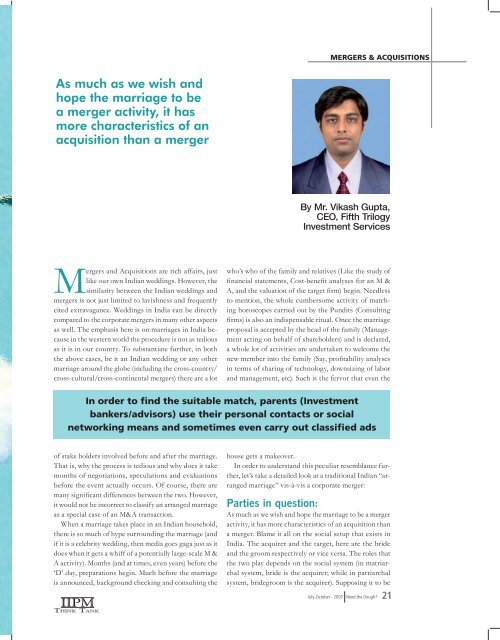
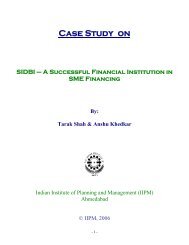
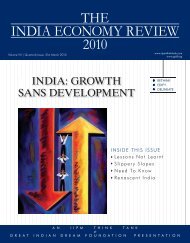
![[Feb 2008, Volume V Annual Issue] Pdf File size - The IIPM Think Tank](https://img.yumpu.com/43961117/1/190x245/feb-2008-volume-v-annual-issue-pdf-file-size-the-iipm-think-tank.jpg?quality=85)
![[June 2008, Volume V Quarterly Issue] Pdf File size - The IIPM Think ...](https://img.yumpu.com/41693247/1/190x245/june-2008-volume-v-quarterly-issue-pdf-file-size-the-iipm-think-.jpg?quality=85)


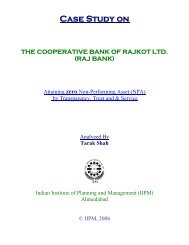

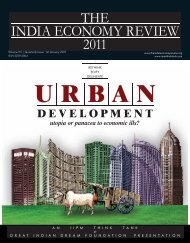
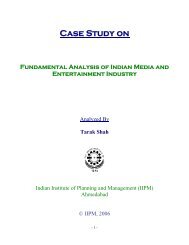
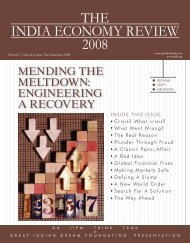
![[Dec 2007, Volume 4 Quarterly Issue] Pdf File size - The IIPM Think ...](https://img.yumpu.com/29766298/1/190x245/dec-2007-volume-4-quarterly-issue-pdf-file-size-the-iipm-think-.jpg?quality=85)
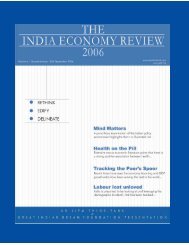
![[Volume VI | Quarterly Issue: 31st May 2009] Pdf File size](https://img.yumpu.com/27796051/1/190x245/volume-vi-quarterly-issue-31st-may-2009-pdf-file-size.jpg?quality=85)